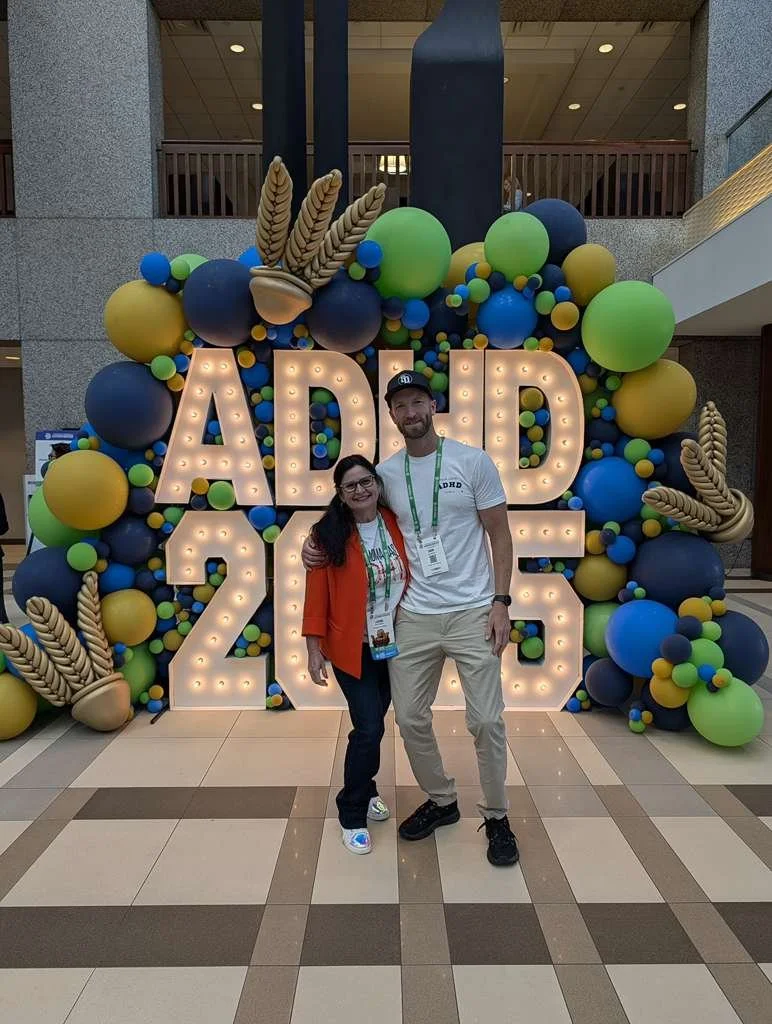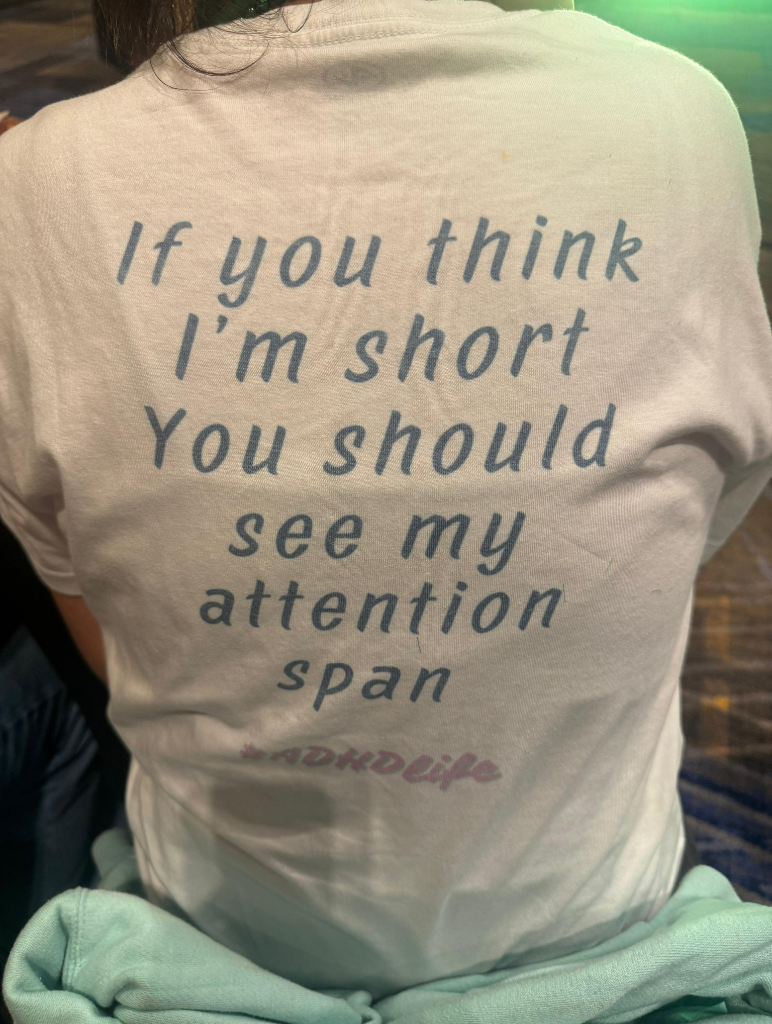Finding My People: Reflections from the International ADHD Conference
"Toto, we aren't in Kansas anymore."
As I sit in the airport waiting to leave Kansas City, I'm reflecting on what felt like stepping into a magical land—one where everyone's brain works like mine. For four days, I was surrounded by 1,000 people who just "get it." And honestly? I'm not ready to leave.
A World Where Being Different Is Normal
You know that feeling when you overshare with someone you just met and then immediately regret it? Or when you forget your name tag for the third time that day? At this conference, those weren't embarrassing moments—they were literally boxes on our conference BINGO card. People laughed, recognized themselves, and kept right on connecting.
The famous speakers and experts in the field? They were approachable, kind, and ego-free. Big emotions weren't just accepted—they were normalized. When it was time for the closing party, organizers offered TWO options: a loud room with dancing, sparkly clothes, and earplugs, or a quiet space for those who needed low-key connection. That's what it looks like when people truly understand how different brains work.
My "Grandma Has ADHD" podcast stickers were a hit, ending up on water bottles all over the conference. And my book? It sold out—even among a sea of other ADHD books. (Thank you to my oldest child Will for designing that eye-catching cover. Apparently, you can judge a book by its cover!)
What I Learned About Us
One phrase from the conference keeps echoing in my mind: "My diagnosis saved my life."
An audience member shared this during the session on women and girls' wellness, and it captures everything I believe about why awareness matters—especially for those of us who were diagnosed later in life or who are still searching for answers.
Dr. Russell Barkley, who was not in attendance but is considered among the ADHD experts was quoted "ADHD is not a disorder of knowing what to do. It's about doing what we know." This is why all the organizing books in the world don't solve our clutter challenges. We know what we should do. Our brains just work differently when it comes to actually doing it.
Another insight that stopped me in my tracks: "Safety is not just the absence of threat. It's the presence of connection." As someone who felt different and misunderstood for decades, I finally understand why finding "my people" has been so transformative.
The Topics That Hit Home
Several themes kept appearing across different sessions, and they're the ones that matter most to those of us navigating midlife and beyond:
Perfectionism and Anxiety: So many of us with ADHD also struggle with anxiety and perfectionist tendencies. We're feeling too much but never quite feeling like we're enough. The experts emphasized that we need to treat ADHD first—anxiety and depression often improve once the underlying ADHD is addressed. Perfectionism is about the shame we feel after a lifetime of judgement, trying to look like we’ve got it all together and “overcompensate” or mask leaving us completely burnt out.
Hiding our ADHD traits (or masking) to fit in—is a huge issue, especially for women. In the presentation I gave about seniors and ADHD, half the attendees reported strained relationships, often because family members don't want to acknowledge that ADHD might run in the family.
Decision Paralysis: The conference explored why we struggle so much with decisions. It's not that we're "bad" at deciding—our brains are trying to weigh too much information at once. As one presenter explained: "Decide literally means to cut away." Every “yes” is a “no” to countless other options, and for ADHD brains that struggle with letting go, this is exhausting.
Aging with ADHD: This is my passion, and I was disappointed (though not surprised) that this topic was largely ignored save for my session.
I feel like I’m shouting from the roof tops but it’s falling on deaf ears.
As I remind anyone who will listen, “Just because your eyes are closed, doesn’t mean it isn’t there.”
This is why my work matters. We need doctors and healthcare providers to pay attention and address the double whammy those of us with ADHD will face as we age with ADHD. This is especially important for people who’ve relied on medications that may no longer be an option due to other health challenges.
Finding Hope in Practical Strategies
Beyond the validation and community, I came away with practical tools—not just for my clients, but for myself:
The concept of "optimal chaos" resonated deeply. We need enough structure to focus but room to play. Rules can actually spark creativity by giving us boundaries (even though our ADHD brains instinctively resist them). As one game designer put it: "Games aren't possible without rules!"
I learned about "radical trust" in coaching—trusting the brilliance of the person in front of you, even when they're dysregulated. This means resisting the urge to fix or lead, and instead sending questions back: "What are you hearing?" or "What are you noticing?" They need to hear themselves so they can make their own decisions.
The most practical session covered strategies for managing emotions: grounding techniques (like the 5-senses exercise), sensory breaks, movement, co-regulation with people or pets, and getting into nature. These aren't just nice ideas—they're essential tools for nervous systems that run on overdrive.
What This Means for You
If you're reading this and feeling alone in your struggles—whether with clutter, relationships, work, or just getting through the day—I want you to know that you're not imagining it. Your challenges are real. But they're also shared by millions of people whose brains work like yours.
Maybe you're in your 50s, 60s, or beyond, and you've spent decades wondering why life has felt so much harder for you than it seems for others. Maybe you're sandwiched between aging parents and adult children, juggling career changes or retirement while also dealing with perimenopause or menopause. Maybe your home is filled with clutter you've been meaning to address for years, and the shame of it keeps you isolated.
You don't have to figure this out alone.
Join Us
I'm building communities specifically for people like us:
Moms in the Middle: For women over 45 who are sandwiched between aging parents and emerging adult children, while also juggling careers and hormonal changes. We face the unique challenges of managing ADHD with perimenopause and menopause wreaking its own havoc.
Virtual Downsizer's Club: For those of us who've been clutter-challenged our entire lives and now want to get things together—to leave a legacy rather than mayhem for our families. First you’ll gain an understanding of why it hasn’t worked before and we’ll work together to build new strategies designed for ADHD brains kicking shame and limiting beliefs to the curb.
The Gift of Understanding
Attending this conference reminded me why I do this work. Every person I met had a story of struggling for years before finally understanding themselves. Many had adult parents who refused to acknowledge ADHD. Others spent decades in therapy that never quite addressed the root issue.
But once they found their answer? Everything changed. Not because ADHD went away, but because shame was replaced with understanding. Judgment was replaced with compassion. Isolation was replaced with community.
One of my favorite conference takeaways was the idea of grieving paths not taken. When we finally understand our ADHD, we often look back and wonder "what if?" The path forward starts with accepting how your brain actually works, not how you think it should work and giving yourself compassion.
You're Remarkable
If there's one thing I want you to take from my conference experience, it's this: People with ADHD are remarkable. Our brains work differently—sometimes that means challenges, but it also means creativity, resilience, adaptability, and a unique way of seeing the world.
You've made it this far by building coping strategies and pushing through struggles that others couldn't imagine. That's not weakness—that's strength. Now imagine what you could do with understanding, proper support, and a community that truly gets it.
It's never too late to find your people. It's never too late to rewrite your story. And it's never too late to stop struggling alone.
If you're ready to explore whether ADHD might be the missing piece of your puzzle, or if you simply want to connect with others who understand, reach out. Let's figure this out together.
Because "diagnosis saves lives" isn't just a catchy phrase—for many of us, it's the literal truth.
Want to learn more? Listen to the "Grandma Has ADHD" podcast and be part of the “Founders Club” where you can join the right community for your age and stage at the lowest price it will ever be offered. Please email grandmahasADHD@gmail.com












